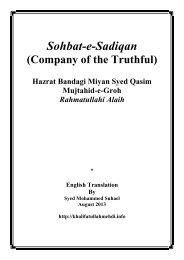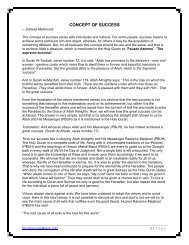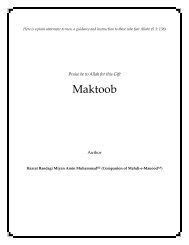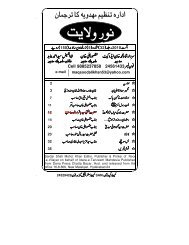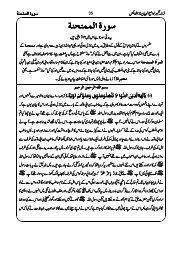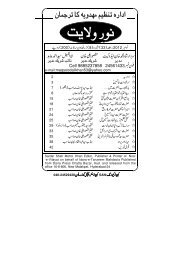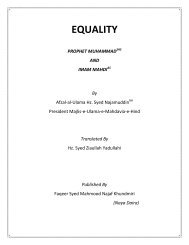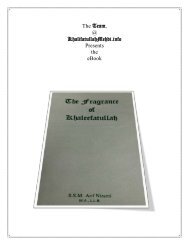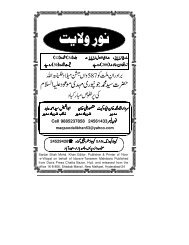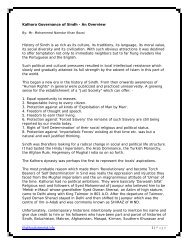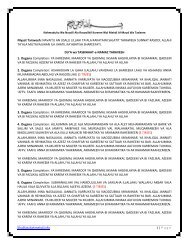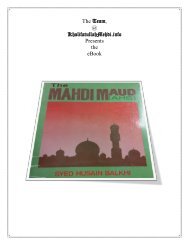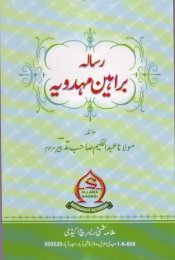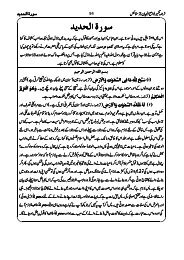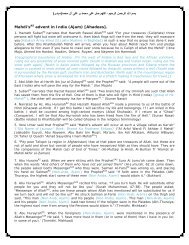Siraj-ul-Absar (English) - Khalifatullah Mehdi (AHS)
Siraj-ul-Absar (English) - Khalifatullah Mehdi (AHS)
Siraj-ul-Absar (English) - Khalifatullah Mehdi (AHS)
You also want an ePaper? Increase the reach of your titles
YUMPU automatically turns print PDFs into web optimized ePapers that Google loves.
8<br />
Many of the above books have been printed and some are yet to be. However most of the<br />
above books are available at www.khalifat<strong>ul</strong>lahmehdi.info.<br />
The team which runs this website had requested Hazrat Zia<strong>ul</strong>lah Saheb to translate <strong>Siraj</strong>-<strong>ul</strong>-<br />
<strong>Absar</strong>. They expressed a desire that since he had translated most of the first generation<br />
Mahdavia books, they wanted to read his translation of this book also. He was reluctant to<br />
work on this translation, as another translation already existed. He did not start the work for a<br />
long time. But the team at www.khalifat<strong>ul</strong>lahmehdi.info persisted with their request.<br />
Ultimately, giving in to their pressure, he started to work on the translation of <strong>Siraj</strong>-<strong>ul</strong>-<strong>Absar</strong><br />
in June 2010. The translation proceeded at quick speed, but in early December of 2010 he fell<br />
down, had a sho<strong>ul</strong>der injury and was bedridden. He co<strong>ul</strong>d not continue the translation<br />
although he was desperate to do it. He still had a few pages of the book left to be translated,<br />
when the call of the Creator came. On the morning of December 26, 2010 / 19 Muharram,<br />
1432 Hijri, he departed from this world. Inna Lillahi wo Inna Ilaihi Rajioon – To Allah we<br />
belong, and to Him we shall return.<br />
In a period of nearly 18 years since 1992, he has rendered yeoman service to the cause of<br />
Mahdavia literature in the <strong>English</strong> language. The translations, which he has done, are the fruit<br />
of hard labour, perseverance and a dedication which is rarely seen. The reader of his books<br />
will hardly be aware of the efforts which went into the translation. It is easier to write a book<br />
than to translate it. A translator has to stay true to the meaning, which the author of the book<br />
intends, but yet present the matter in an easily readable way in the translated language. The<br />
task is made much more diffic<strong>ul</strong>t in the translation of religious literature, especially Mahdavia<br />
literature which contains unique terminology and deals with subjects that have no comparable<br />
reference in the literature of the outside world. But Hazrat Zia<strong>ul</strong>lah Saheb succeeded in<br />
transcending these hurdles and wrote in a language that was easily understood by all and yet<br />
conveyed the meaning of the original text.<br />
Praising the translation excellence of Hazrat Zia<strong>ul</strong>lah Saheb, Hazrat Syed Ali Bartar Saheb,<br />
the well-known scholar of the Mahdavia community, writes in the foreword of the <strong>English</strong><br />
translation of Insaf Nama:<br />
Insaf Nama is a sizeable book with a large number of Quranic Verses, Prophetical<br />
Traditions (Ahadiths) and the Imam’s narrations (Naqliyat). Its translation into<br />
<strong>English</strong> is a diffic<strong>ul</strong>t job. But Zia<strong>ul</strong>lah Saheb has done it in an easy-to-read style. The<br />
reader may feel that he is reading an <strong>English</strong> book, not a translation. His work needs<br />
to be praised.<br />
Hazrat Mashaiq Syed Yusuf Khaleel Saheb of Panagudi has written in the prologue of the<br />
same book:<br />
His style and language are simple, clear, direct, effective, to the point and easily<br />
intelligible for the readers.<br />
His translation journey was riddled with testing times as well. After he completed his<br />
translation of Insaf Nama, he lost his eyesight. Recounting this incident in the Translator’s<br />
Note of Naqliyat, he wrote:<br />
After I had completed the work on Insaf Nama and its proof reading was in progress,<br />
all of a sudden I lost my eyesight. That was an extraordinarily frustrating experience.<br />
In the same condition, I performed the Haj pilgrimage with the help Allah provided<br />
through friends. I was more disappointed when, on return and after a cataract eye<br />
operation, the surgeon told me that he “doubted” if I wo<strong>ul</strong>d ever be able to read and<br />
write again. However, I supplicated that Allah may restore my eyesight to enable me<br />
to continue my translation work. One day, after the prayers, when I opened my eyes, I



